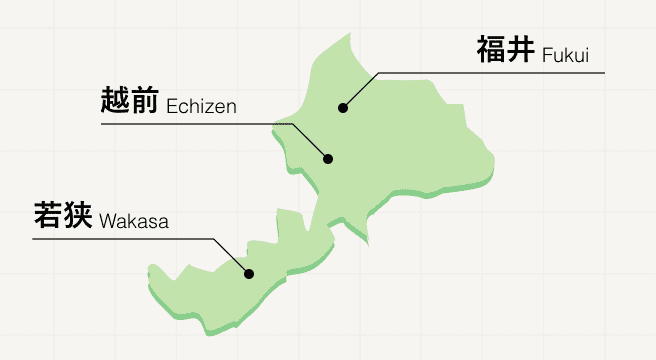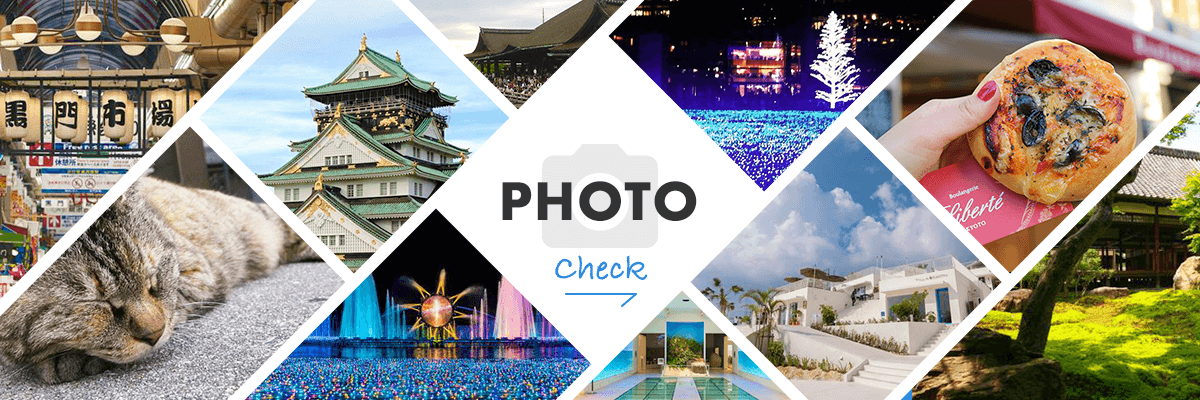Other Historic Site/Building Spots in Fukui Area
Area
-
-
Fukui
-
-
Fukui

-
-
Other Historic Site/Building
-
Other Historic Site/Building
Category


-
- Yokokan Garden
- Travel / Tourism
- Fukui Pref. Fukuishi Houei 3-11-36
- Yokokan was the Fukui feudal lord’s Matsudaira Family villa and was called the “Osensui Residence” during the Edo period. It had a Japanese strolling pond garden with a large pond at its center. Various ingenuities have been assimilated into the garden and it is considered that the view from around the banks of the pond and the view from within the residence were taken into consideration. The sukiya zukuri style (in the style of a tea ceremony house) of building called the “Ochaya” located on the east of the pond plays a central role in this building. You can have green tea and sweets at “Otsukiminoma”, and you can spend your time leisurely while enjoying the scenery with Japanese Iris being reflected in the pond.
-
- Yoshizaki Gobo Temple Remains (Miyama)
- Travel / Tourism
- Fukui Pref. Awarashi Yoshizaki 2 Nishi Oyama 148-2
- With its surroundings referred to as “Rennyo no Sato”, the Yoshizaki Gobo Temple Remains have a tradition of being selected as a missionary base in Hokuriku by Rennyo Shonin, restorer of the Hongan-ji Jodo Shinshu sect of Buddhism. It is still visited by many today. Its largest festival—the “Rennyoki” (anniversary of Rennyo’s death)—is held every year from late April to May.
-
- Maruoka Domain Battery
- Travel / Tourism
- Fukui Sakai-shi Mikunicho Kaji
- A historical location located alongside Prefectural Route 7 in Kaji, Mikuni-cho, Sakai City. This is the remains of a battery built in 1852 to defend the coast of the Maruoka Domain. Remains of parapets, which would provide defense from attack while allowing return fire were built from mounded earth and stretch 33 meters from the east to the west. The site is designated as a National Historic Location.
-
- Mermaid Terrace
- Travel / Tourism
- Fukui Obama-shi Obamahiyoshi
- A terrace along Kaigan-dori Street in Obamahiyoshi, Obama City. There are two mermaid statues on the terrace with a link to the legend of Yao-Bikuni who was said to live for 800 years after eating the flesh of a mermaid. Along with being a great place to watch the sunset sink into the sea there's a promenade perfect for strolling that hugs the coast and leads to Obama Park.
-
- Tamagawa Dokutsu (Cave) Kannon
- Travel / Tourism
- Fukui Nyu-gun Echizencho Tamagawa
- A Buddhist statue enshrined along the Isaribi Kaido Road in Tamagawa, Echizen Town, Nyu County. Legend states that long ago the enshrined statue of eleven-faced Kannon was caught by happenstance in a local fisherman's net. It was originally enshrined in a natural cave as the name suggests but the cave collapsed in 1989. It is now in a man-made concrete tunnel, surrounded by illuminated Echizen-ware pottery.
-
- Somayama Castle Ruins
- Travel / Tourism
- Fukui Nanjo-gun Minamiechizencho Akuwa
- A historic location in Akuwa, Minamiechizen Town, Nanjo County. This is the ruin of Somayama Castle, which was the base point for the southern army during the Period of Northern and Southern Dynasties when the imperial court was split and was the castle where Nitta Yoshisada barricaded himself in. Based on cornerstones and other remains found during archaeological digs it is believed that the inner citadel was situated 492-meters above sea level atop the peak with eastern and western sections built to either side. It's been designated as a National Historic Site.
-
- Nishiyama Koshoji Temple Ruins
- Travel / Tourism
- Fukui Fukui-shi Abakacho
- A historical site near Ichijodani Station in Abaka-cho, Fukui City. It's located within the Ichijodani Asakura Family Historic Ruins Special Historic Site and the former grounds of what is now the Fukui City Kagetsu Nishiyama Koshoji Temple known for the Fukui Dai-Butsu great Buddha statue. A number of stone Buddha statues and building cornerstones found during archaeological digs confirm that this was once a vast temple area.
-
- Karamon Gate
- Travel / Tourism
- Fukui Fukui-shi Kidonouchicho
- This gate was the original entrance to Shounin Temple. The temple is tied to the Asakura Clan, which ruled the entire Echizen Province during the warring states period. It was built in order to pray for the repose of the soul of the Asakura Yoshikage, the fifth head of the Asakura Clan, following his death and the clan’s destruction by Oda Nobunaga’s forces. The temple was later relocated and now only this gate remains at its original location. The gate is part of the Ichijodani Asakura Clan Ruins, which serve to convey the history of the Asakura Clan. It also functions as the entrance to the historic ruins. Its unique Chinese-style design helps to convey the culture of that time to today.
-
- Asakura Yakata Ruins
- Travel / Tourism
- Fukui Fukui-shi Kidonouchicho
- These ruins were once the manor house of the Asakura Clan, which ruled Echizen Province during the warring states period. The ruins are part of the Ichijodani Asakura Clan Ruins, which serve to convey the history of the Asakura Clan. It is said that it was the residence of Asakura Yoshikage, the fifth head of the Asakura Clan. Its vast grounds are surrounded by earthen walls and moats on three sides. The home’s tsunegoten (master’s pavilion), main building, tearoom, kitchens, and other buildings were once neatly arranged within this enclosure. The flower beds in its gardens are believed to be the oldest in Japan. The garden’s large scale and refined appearance can still be seen in its beautifully-designed rock arrangements.
-
- Yudono Ato Garden
- Travel / Tourism
- Fukui Fukui-shi Kidonouchicho
- This garden is part of the Ichijodani Asakura Clan Ruins, which serve to convey the history of the Asakura Clan that ruled Echizen Province during the warring states period. The garden is located on high ground overlooking the ruins of the Asakura Yakata, the former residence of the Asakura Clan’s fifth head, Asakura Yoshikage. The garden, which features a wild and vigorous rock arrangement, has a different appearance from the other gardens in the ruins. Waterways built along the mountain’s edge from north to south lead to the top of a waterfall. It is said to be the oldest garden in the Ichijodani Asakura Clan Ruins.
-
- Suwa Yakata-ato Garden
- Travel / Tourism
- Fukui Fukui-shi Kidonouchicho
- This garden is part of the Ichijodani Asakura Clan Ruins, which serve to convey the history of the Asakura Clan that ruled Echizen Province during the warring states period. The Suwa Yakata was said to be the manor house of Koshosho, one of Asakura Yoshikage’s concubines. Its garden is the most spacious in all of the Ichijodani ruins. The two-tiered garden’s upper tier features waterfall and spring rock formations. The lower tier features a stirring waterfall formed by a large boulder arranged under a large Japanese maple. This boulder is engraved with the posthumous names of individuals including the Asakura Clan’s third lord Sadakage and its fourth lord Takakage.
-
- Yoshizaki Gobo
- Travel / Tourism
- Fukui Awara Yoshizaki
-
- Sanrokurentaiheishiseki
- Travel / Tourism
- Fukui Pref. Sabaeshi Sanrokuchou 2-chome
-
- Asakura Yoshikage Historical SItes (Asakura Yoshikage Grave site)
- Travel / Tourism
- Fukui Ono-shi Izumicho 10
-
- Kamifune Tsuka Ancienct Burial Mound
- Travel / Tourism
- Fukui Mikatakaminakagun-gun Wakasacho
-
- Kamino Tsuka Ancienct Burial Mound
- Travel / Tourism
- Fukui Mikatakaminakagun-gun Wakasacho
-
- Shibata Mr. garden
- Travel / Tourism
- Fukui Pref. Tsurugashi Ichinonochou 1-chome
-
- Collection of language
- Travel / Tourism
- Fukui Prefecture Nanjo-gun Minami Echizencho
-
- Ito Mr. garden
- Travel / Tourism
- Fukui Prefecture Nanjo-gun, South Echizen
-
- Ajimano En
- Travel / Tourism
- Fukui Echizen-shi Yokawacho
Fukui Areas

Northeast of Kyoto, the ancient Tojinbo Cliffs separate Fukui prefecture from the Sea of Japan in a stretch of land well worth exploring. Water sports and seaside delicacies are available in abundance as the spectacular rugged coastline flattens down into beaches to the west of the prefecture, while inland, Fukui is home to Zen Buddhist temples and historic ruins.
Best of Fukui
Search by Region
-
- Hokkaido / Tohoku
- Hokkaido
- Aomori
- Iwate
- Miyagi
- Akita
- Yamagata
- Fukushima
-
- Kanto
- Ibaraki
- Tochigi
- Gunma
- Saitama
- Chiba
- Tokyo
- Kanagawa
-
- Koshinetsu / Hokuriku
- Niigata
- Toyama
- Ishikawa
- Fukui
- Yamanashi
- Nagano
-
- Tokai
- Gifu
- Shizuoka
- Aichi
- Mie
-
- Kinki
- Shiga
- Kyoto
- Osaka
- Hyogo
- Nara
- Wakayama
-
- Chugoku
- Tottori
- Shimane
- Okayama
- Hiroshima
- Yamaguchi
-
- Shikoku
- Tokushima
- Kagawa
- Ehime
- Kochi
-
- Kyushu / Okinawa
- Fukuoka
- Saga
- Nagasaki
- Kumamoto
- Oita
- Miyazaki
- Kagoshima
- Okinawa






















